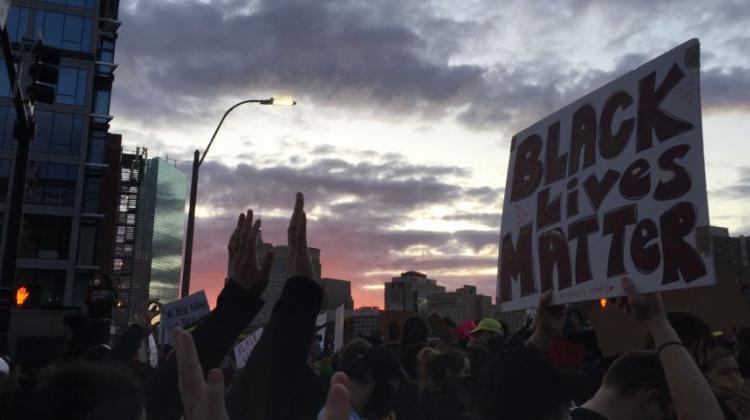Confronting Systems of Violence

Photo taken by DUSP doctoral candidate, Nicholas Kelly, at the Black Lives Matter protests in Boston, Massachusetts following a series of killings of Black Americans most recently at the time with the murder of George Floyd in Minneapolis, Minnesota.
The reality of the world today urgently calls us to reimagine what is required to build inclusive, thriving, and sustainable cities. Towards these ends, DUSP is committed to a transformation of our departmental culture as well as our approach to teaching, research, and career development. DUSP stands in solidarity and seeks to support Black Lives Matter and other movements drawing attention to systemic racism that permeates all aspects of life in the USA. We stand in support of the many student-led initiatives at MIT, including: the Black DUSP Thesis; the DUSP Students of Color Committee; Black DUSP Magic; the MIT Black Student Union; and the MIT Black Graduate Student Association. We endorse the BGSA and BSU’s petition to MIT leadership to support Black lives at MIT.
Specifically, as a department we commit to these ongoing Institute-wide processes and efforts, such as the ICEO plan and the BGSA/BSU recommendations, to implementing these recommendations, and to inviting, encouraging, and supporting our colleagues in other departments to join in this commitment (with special attention to those departments we work closely with, including Architecture and Computer Science).
More concretely, we are working internally to become an actively anti-racist organization, in a way that is strategically integrated with our capability to tackle many of the other challenges the world faces, such as: the public health crisis, the housing affordability crisis, the employment crisis, the climate crisis. Fortunately, DUSP has a lot to build from as we move forward in this work and this fall term, we have numerous exciting activities and programs underway.
In July, a group of Black students (Black DUSP Magic) and allies published a document (aka, Black DUSP Thesis) that details numerous key priorities and immediate actions to guide DUSP in our anti-racist transformation, including through our research and teaching, admissions, career and professional development services, in our curriculum, and our systems of accountability. DUSP has embraced this work and is moving to operationalize as many of the identified key priorities and immediate actions as quickly as possible. We will develop a transparent accountability framework to use for assessing progress.
Also in July, current DUSP Lecturer and incoming (in 2021) Assistant Professor of Urban History, Public Policy and Planning, Karilyn Crockett was appointed the Chief of Equity for the City of Boston. In this position, she will head the Mayor's Equity and Inclusion Cabinet, which will drive the city's work to dismantle systemic racism and embed equity in all planning and operations. This is an amazing opportunity at an extraordinary moment in history as Karilyn leads work to apply an equity lens to every city department and service. Not only will she be examining how Boston’s Equity and Inclusion Cabinet can begin to influence operations of the rest of the City Government, but she will also be overseeing the city’s newly formed Racial Equity Fund, a pool of resources aimed at undoing systemic racism and its outcomes, especially the wealth gap. Mayor Walsh’s commitment to combat systemic racism in every way that city government touches people's lives is wholly consistent with DUSP’s commitment and obligation to do the same. Karilyn’s role in this undertaking provides an unparalleled opportunity for collaboration between the city and DUSP. We envision, for the coming year, organizing a series of research and teaching opportunities, which we hope will lead to longer-term collaborative initiatives with the city.
As we start the fall term, to center the underlying systemic issues in the DUSP curriculum and spark a longer-term transformational change, the department has developed a new five-week “teach-in” to start the semester. The teach-in uses a transitional justice framework, a means to recognize (often hidden) histories of human rights abuses, understand the implications for the present, and identify paths forward to the future. The work is animated by the question, “What would planning look like if it were to radically confront its painful past of identity-based violence, exclusions, and oppressions; recalibrate our present practices and knowledges to respond; in order to envision more just cities?” The teach-in centers issues of racial and social justice, multi-racial community, and critical self-reflection as a means to build a better practice. We will think differently about differences, asking ourselves to consider the role and effect of power in driving injustice. We will ground our conversations in diverse and cutting-edge thinking while paying heed to the lessons, traumas, and advances of the past. Throughout, we will have a practical eye on the future.
Anti-Black racism and White supremacy in the USA are part of a broader, structural global human rights problem, exemplified elsewhere in the world in the legacies of colonialism and exclusions based on race, class, religion, and/or gender. DUSP cannot ignore the complicity of planning in these systems and outcomes. Building communities based on equity and inclusion is planning’s duty. Only by dismantling systemic racism can we confront the overlapping social, environmental, health, and economic crises facing cities globally. DUSP must marshal all of our power, privilege, resources, and prestige to make ourselves, the Institute, and our broader societies anti-racist. Without doing so, we cannot make meaningful progress, as city planners, as citizens, as human beings. Anti-racism must become central to DUSP; taking this on as an entire Department is long overdue and we will not stop until the work is no longer necessary. DUSP knows and affirms that Black Lives Matter.


